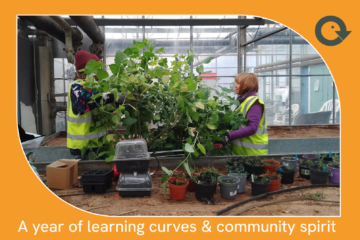5 reasons to love growing food on your allotment
You can grow and eat your own food
Allotments encourage exercise and benefit mental health
Allotments create a sense of community
Allotments improve the environment
Allotments are beneficial to wildlife
It’s National Allotment Week and we wanted to take the opportunity to say a big THANK YOU to all the allotmenteers and growers who are already involved in our Grow a Row and Repurpose Your Surplus schemes.
This year the theme for National Allotment Week is Plotting for the Future and this is exactly what our local growers and allotmenteers are doing by helping us to source more of our produce locally.
Together we are helping to build a more fair and sustainable food system for Sheffield.
Five reasons why allotments are fantastic:
1. You can grow (and eat) your own food from your allotment
Growing your own food is an extremely satisfying process that brings so many people so much joy as well as a huge sense of achievement. You are able to harvest your fruit and vegetables at peak ripeness so that it not only tastes better but has greater nutritional value than the produce we buy in the supermarkets.
2. Allotments encourage exercise and have mental health benefits
As well as being satisfying, gardening can be hard work and will definitely help you to keep fit. Spending time outside not only gives you time in the fresh air, but also helps you to keep your vitamin D levels up. Many people find that spending time on their allotment gives them much needed time away from the hustle and bustle of everyday life. Time at the allotment is time to relax, reconnect with nature and turn off for a while.
3. Allotments create a sense of community
Having an allotment is a fantastic way to make friends. Once you have an allotment no doubt you will soon bump into your neighbours and become part of the allotment community. Many allotments have allotment societies with an allotment shop where you can buy seeds and compost, as well as arranging events such as BBQs and plant sales.
4. Allotments help improve the environment
Growing your own food reduces your personal carbon footprint by reducing the food miles of the food you eat. According to foodmiles.com (02/08/21) the average distance a supermarket bought tomato travels before being consumed is 2160 miles!
Many allotmenteers also make their own compost and composting is one of the easiest ways that people can work towards a more circular economy.
Allotments are green havens with an abundance of trees, shrubs and hedgerows, sometimes in otherwise completely urban areas. They offer similar benefits to parks by increasing air quality, reducing flood risk and giving local people access to nature.
5. Allotments are beneficial to wildlife
Allotments provide habitat for insects (including pollinators), mammals, birds and amphibians. They help users to connect with nature and gain a better understanding of the local ecosystem as users become more aware of the seasonal changes of the flora and fauna.


